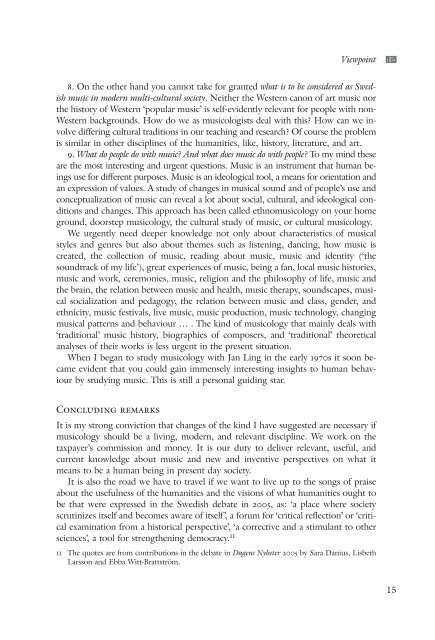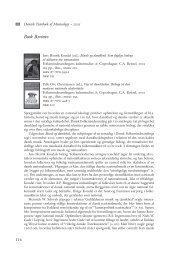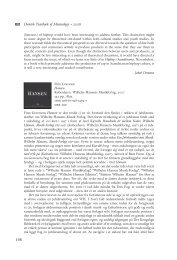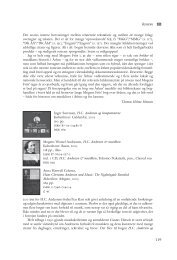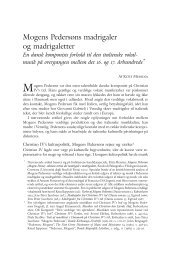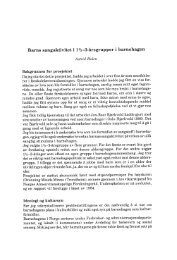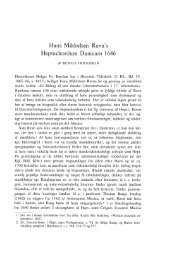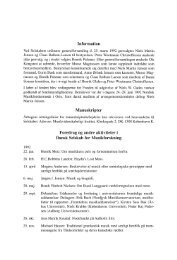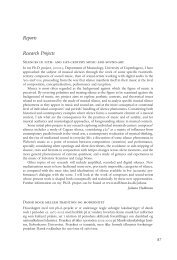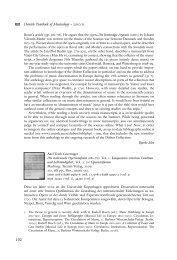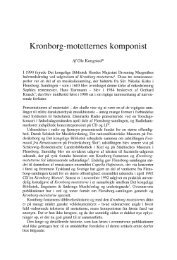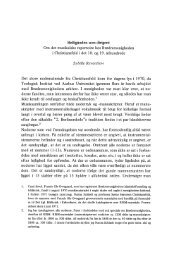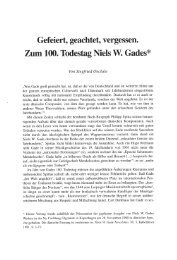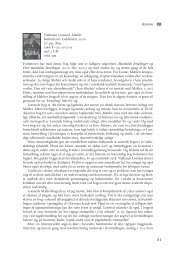Danish Yearbook of Musicology 33 ⢠2005 / Dansk årbog ... - dym.dk
Danish Yearbook of Musicology 33 ⢠2005 / Dansk årbog ... - dym.dk
Danish Yearbook of Musicology 33 ⢠2005 / Dansk årbog ... - dym.dk
You also want an ePaper? Increase the reach of your titles
YUMPU automatically turns print PDFs into web optimized ePapers that Google loves.
Viewpoint<br />
8. On the other hand you cannot take for granted what is to be considered as Swedish<br />
music in modern multi-cultural society. Neither the Western canon <strong>of</strong> art music nor<br />
the history <strong>of</strong> Western ‘popular music’ is self-evidently relevant for people with non-<br />
Western backgrounds. How do we as musicologists deal with this How can we involve<br />
differing cultural traditions in our teaching and research Of course the problem<br />
is similar in other disciplines <strong>of</strong> the humanities, like, history, literature, and art.<br />
9. What do people do with music And what does music do with people To my mind these<br />
are the most interesting and urgent questions. Music is an instrument that human beings<br />
use for different purposes. Music is an ideological tool, a means for orientation and<br />
an expression <strong>of</strong> values. A study <strong>of</strong> changes in musical sound and <strong>of</strong> people’s use and<br />
conceptualization <strong>of</strong> music can reveal a lot about social, cultural, and ideological conditions<br />
and changes. This approach has been called ethnomusicology on your home<br />
ground, doorstep musicology, the cultural study <strong>of</strong> music, or cultural musicology.<br />
We urgently need deeper knowledge not only about characteristics <strong>of</strong> musical<br />
styles and genres but also about themes such as listening, dancing, how music is<br />
created, the collection <strong>of</strong> music, reading about music, music and identity (‘the<br />
soundtrack <strong>of</strong> my life’), great experiences <strong>of</strong> music, being a fan, local music histories,<br />
music and work, ceremonies, music, religion and the philosophy <strong>of</strong> life, music and<br />
the brain, the relation between music and health, music therapy, soundscapes, musical<br />
socialization and pedagogy, the relation between music and class, gender, and<br />
ethnicity, music festivals, live music, music production, music technology, changing<br />
musical patterns and behaviour … . The kind <strong>of</strong> musicology that mainly deals with<br />
‘traditional’ music history, biographies <strong>of</strong> composers, and ‘traditional’ theoretical<br />
analyses <strong>of</strong> their works is less urgent in the present situation.<br />
When I began to study musicology with Jan Ling in the early 1970s it soon became<br />
evident that you could gain immensely interesting insights to human behaviour<br />
by studying music. This is still a personal guiding star.<br />
Concluding remarks<br />
It is my strong conviction that changes <strong>of</strong> the kind I have suggested are necessary if<br />
musicology should be a living, modern, and relevant discipline. We work on the<br />
taxpayer’s commission and money. It is our duty to deliver relevant, useful, and<br />
current knowledge about music and new and inventive perspectives on what it<br />
means to be a human being in present day society.<br />
It is also the road we have to travel if we want to live up to the songs <strong>of</strong> praise<br />
about the usefulness <strong>of</strong> the humanities and the visions <strong>of</strong> what humanities ought to<br />
be that were expressed in the Swedish debate in <strong>2005</strong>, as: ‘a place where society<br />
scrutinizes itself and becomes aware <strong>of</strong> itself’, a forum for ‘critical reflection’ or ‘critical<br />
examination from a historical perspective’, ‘a corrective and a stimulant to other<br />
sciences’, a tool for strengthening democracy. 11<br />
11 The quotes are from contributions in the debate in Dagens Nyheter <strong>2005</strong> by Sara Danius, Lisbeth<br />
Larsson and Ebba Witt-Brattström.<br />
15


